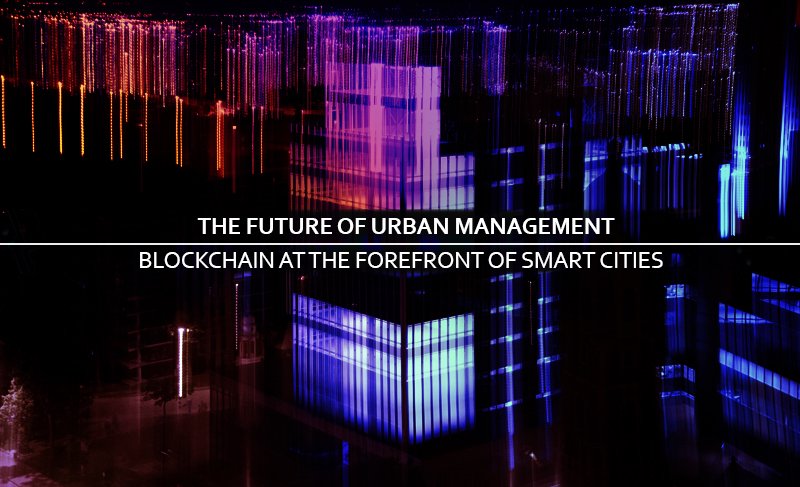
The future of Urban Management: Blockchain at the forefront of Smart Cities
“Blockchain technology is not limited to its applications to cryptocurrencies only but has many applications in smart city projects. Effective implementation of Blockchain allows municipalities and organizations to drive smart city projects with utmost resilience, efficiency, and sustainability”.
Blockchain, as we know it, is an emerging technology that facilitates the process of recording transactions in a business network which can be either tangible such as a house, car, or land) or intangible (intellectual property, patents, branding).
The significant traction that Blockchain has got is the transactions based on cryptocurrencies. While it ensures a flawless application in virtual currencies, it also provides many potential applications in other sectors and industries.
Smart Cities is one such asset, where Blockchain has magnanimous potential applications set to revolutionize the entire Smart Cities culture.
The growing trends of Smart cities project its global market value to reach USD 2,400 Billion by 2027.
Factors such as a rise in the need for sustainable and efficient smart cities and an increased demand for smart city projects are fuelling the growth of the global smart cities market.
The components of smart cities, including smart homes, fingerprint-scanning door locks, and voice control assistants, have become a reality now. And it won’t take much time when similar applications of Blockchain will make the entire value chain of Smart cities even more innovative.
With the rise in the digitization of businesses, corporates, and even cities, municipalities have become aware of leveraging g the unidentified potential of technologies such as Blockchain.
Blockchain primarily focuses on creating more secure, transparent, efficient, and resilient cities enabling digital tools and technologies putting in its significance with the utmost potential.
The use of Blockchain in the overall development of smart cities can play a crucial role in solving ongoing societal issues and improving day-to-day operations.
The below-discussed elements tell how Blockchain has the massive potential to revolutionize future smart cities.
1.Improving the Cybersecurity
Blockchain is no more limited to cryptocurrencies only. It has shifted to an all-new level of its extensive applications anywhere, particularly where a chain of trust is needed proving quite beneficial for smart cities.
Recent research suggests that cybercrimes will cost companies USD 10 trillion by 2025.
Cybersecurity is one such application area of Blockchain where its embedment will not only reduce the potential cyber-attacks but also mitigate the existing ones.
It further promotes end-to-end encryption, secure communication, and better authentication with Blockchain can help improve cybersecurity with AI and IoT devices.
2.Better Waste Management
Waste management is one of the most crucial aspects of a smart city.
With the surge in digitization, smart waste management has become prominent that’s where smart waste management becomes essential.
Its potential applications help municipalities maintain a clean environment and high hygiene in intelligent cities by tracking various waste management aspects.
For example, it provides municipalities and organizations with transparent, immutable information about the amount of waste collected, its disposal, and its recycling methods.
3.Energy Savings
Smart energy conservation leads to smart management of cities. Energy savings forms an integral part of the success of a smart city project.
Municipalities and organizations are striving towards a greener and cleaner planet by minimizing the use of resources while primarily focussing on developing future smart cities with blockchain technology.
Blockchain is used to increase energy savings in smart cities. For instance, a blockchain-based network is used to monitor the citizens’ energy consumption enabling citizens to trade surplus electricity in exchange for incentives.
4.Efficient Mobility
Blockchain has the potential to boost transportation services in smart cities by creating a point-to-point vehicular network, enabling efficient vehicle tracking, providing a secured vehicle and driver registration platform, and notifying owners about essential updates.
For instance, using Blockchain for smart cities helps create secure vehicle owner data tracking to avoid risks of vehicle thefts and enhance the vehicle sale and resale process altogether.
Many governments across the geographies have already started implementing Blockchain for smart cities.
For example, the initiatives like Blockchain4cities, a United Nations working group to determine how Blockchain can be applied to running smart cities, are accelerating the adoption of Blockchain for smart cities, enabling smart city projects to gain more success than ever.
Leader Group’s Smart Cities solutions have been setting industry benchmarks enabling municipalities and corporates to drive smart cities projects efficiently in digitally driven ways without compromising the quality of projects.
Conclusion
Smart Cities projects are now gaining traction more than ever. With the rise in emerging technologies, achieving smart cities is an absolute reality.
With its multiple applications and potential catering to smart waste management, smart mobility, energy savings, and robust cybersecurity measures, Blockchain allows municipalities to leverage smart city projects more effectively.





